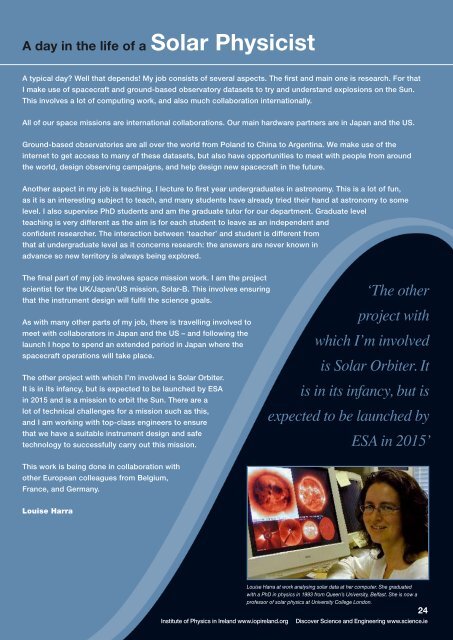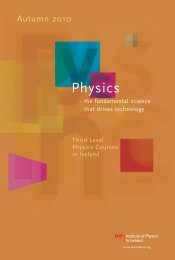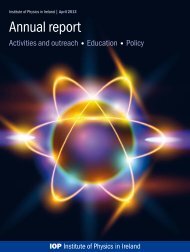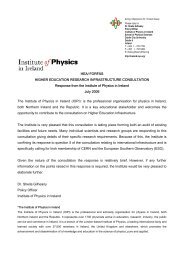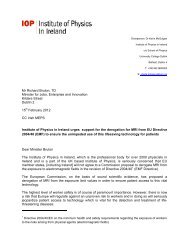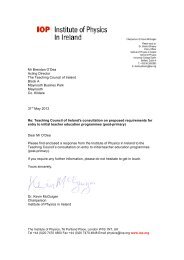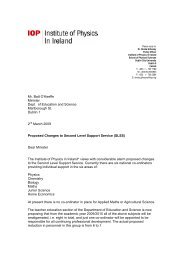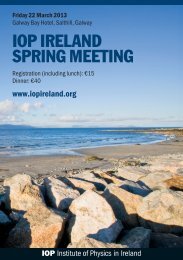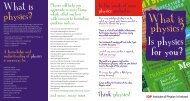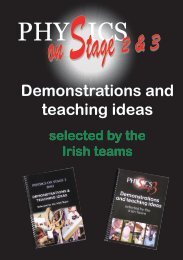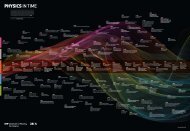28 Days 28 Physicists - The Institute of Physics in Ireland
28 Days 28 Physicists - The Institute of Physics in Ireland
28 Days 28 Physicists - The Institute of Physics in Ireland
Create successful ePaper yourself
Turn your PDF publications into a flip-book with our unique Google optimized e-Paper software.
A day <strong>in</strong> the life <strong>of</strong> a Solar Physicist<br />
A typical day? Well that depends! My job consists <strong>of</strong> several aspects. <strong>The</strong> first and ma<strong>in</strong> one is research. For that<br />
I make use <strong>of</strong> spacecraft and ground-based observatory datasets to try and understand explosions on the Sun.<br />
This <strong>in</strong>volves a lot <strong>of</strong> comput<strong>in</strong>g work, and also much collaboration <strong>in</strong>ternationally.<br />
All <strong>of</strong> our space missions are <strong>in</strong>ternational collaborations. Our ma<strong>in</strong> hardware partners are <strong>in</strong> Japan and the US.<br />
Ground-based observatories are all over the world from Poland to Ch<strong>in</strong>a to Argent<strong>in</strong>a. We make use <strong>of</strong> the<br />
<strong>in</strong>ternet to get access to many <strong>of</strong> these datasets, but also have opportunities to meet with people from around<br />
the world, design observ<strong>in</strong>g campaigns, and help design new spacecraft <strong>in</strong> the future.<br />
Another aspect <strong>in</strong> my job is teach<strong>in</strong>g. I lecture to first year undergraduates <strong>in</strong> astronomy. This is a lot <strong>of</strong> fun,<br />
as it is an <strong>in</strong>terest<strong>in</strong>g subject to teach, and many students have already tried their hand at astronomy to some<br />
level. I also supervise PhD students and am the graduate tutor for our department. Graduate level<br />
teach<strong>in</strong>g is very different as the aim is for each student to leave as an <strong>in</strong>dependent and<br />
confident researcher. <strong>The</strong> <strong>in</strong>teraction between ‘teacher’ and student is different from<br />
that at undergraduate level as it concerns research: the answers are never known <strong>in</strong><br />
advance so new territory is always be<strong>in</strong>g explored.<br />
<strong>The</strong> f<strong>in</strong>al part <strong>of</strong> my job <strong>in</strong>volves space mission work. I am the project<br />
scientist for the UK/Japan/US mission, Solar-B. This <strong>in</strong>volves ensur<strong>in</strong>g<br />
that the <strong>in</strong>strument design will fulfil the science goals.<br />
As with many other parts <strong>of</strong> my job, there is travell<strong>in</strong>g <strong>in</strong>volved to<br />
meet with collaborators <strong>in</strong> Japan and the US – and follow<strong>in</strong>g the<br />
launch I hope to spend an extended period <strong>in</strong> Japan where the<br />
spacecraft operations will take place.<br />
<strong>The</strong> other project with which I’m <strong>in</strong>volved is Solar Orbiter.<br />
It is <strong>in</strong> its <strong>in</strong>fancy, but is expected to be launched by ESA<br />
<strong>in</strong> 2015 and is a mission to orbit the Sun. <strong>The</strong>re are a<br />
lot <strong>of</strong> technical challenges for a mission such as this,<br />
and I am work<strong>in</strong>g with top-class eng<strong>in</strong>eers to ensure<br />
that we have a suitable <strong>in</strong>strument design and safe<br />
technology to successfully carry out this mission.<br />
This work is be<strong>in</strong>g done <strong>in</strong> collaboration with<br />
other European colleagues from Belgium,<br />
France, and Germany.<br />
‘<strong>The</strong> other<br />
project with<br />
which I’m <strong>in</strong>volved<br />
is Solar Orbiter. It<br />
is <strong>in</strong> its <strong>in</strong>fancy, but is<br />
expected to be launched by<br />
ESA <strong>in</strong> 2015’<br />
Louise Harra<br />
<strong>Institute</strong> <strong>of</strong> <strong>Physics</strong> <strong>in</strong> <strong>Ireland</strong> www.iopireland.org<br />
Louise Harra at work analys<strong>in</strong>g solar data at her computer. She graduated<br />
with a PhD <strong>in</strong> physics <strong>in</strong> 1993 from Queen’s University, Belfast. She is now a<br />
pr<strong>of</strong>essor <strong>of</strong> solar physics at University College London.<br />
24<br />
Discover Science and Eng<strong>in</strong>eer<strong>in</strong>g www.science.ie


